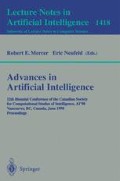Abstract
This paper introduces multi-strategy planning and describes its implementation in the DoLlittle system, which can combine many different planning strategies, including means-ends analysis, macro-based planning, abstraction-based planning (reduced and relaxed), and case-based planning on a single problem. Planning strategies are defined as methods to reduce the search space by exploiting some assumptions (so-called planning biases) about the problem domain. General operators are generalizations of standard Strips operators that conveniently represent many different planning strategies. The focus of this work is to develop a representation weak enough to represent a wide variety of different strategies, but still strong enough to emulate them. The search control method applies different general operators based on a strongest first principle; planning biases that are expected to lead to small search spaces are tried first. An empirical evaluation in three domains showed that multi-strategy planning performed significantly better than the best single strategy planners in these domains.
Preview
Unable to display preview. Download preview PDF.
References
Jacky Baltes. DoLittle: a learning multi-strategy planning system. PhD thesis, University of Calgary, June 1996.
A. Blum and M. Furst. Fast planning through plan-graph analysis. In Proceedings IJCAI-95, 1995.
Tom Bylander. Complexity results for planning. In Proceedings of the Twelfth International Joint Conference on Artificial Intelligence, pages 274–279, Sydney, 1991.
David Chapman. Planning for conjunctive goals. Artificial Intelligence, 32:333–378, 1987.
Stephen V. Chenoweth. On the np-hardness of blocks world. In Proceedings Ninth National Conference on Artificial Intelligence, volume 2, pages 623–628, Stenlo Park, July 1991. AAAI Press/The MIT Press.
Matt Ginsberg. A new algorithm for generative planning. In Proceedings KR-96, 1996.
Jeffrey Gould and Robert Levinson. Experience-based adaptive search. In Ryszard Michalski and Gheorghe Tecuci, editors, Machine Learning: A multi-strategy approach, volume 4, pages 579–603, San Francisco, Ca, 1994. Morgan Kaufmann Publishers.
Kristian J. Hammond. Case Based Planning. Academic Press Inc., 1989.
Glenn A. Iba. A heuristic approach to the discovery of macro-operators. Machine Learning, 3:285–318, 1989.
R. E. Korf. Planning as search: A quantitative approach. Artificial Intelligence, 33(1):65–88, 1987.
Steven Minton. Learning Search Control Knowledge: An Explanation-based Approach. Kluwer Academic Publishers, Boston, 1988.
Tom Mitchell. The need for biases in learning generalizations. In J. Shavlik and T. Dietterich, editors, Readings in Machine Learning, pages 184–191. Morgan Kaufmann, 1990.
David Ruby and Dennis Kibler. Steppingstone: An empirical and analytical evaluation. In Proceedings of the Ninth National Conference on Artificial Intelligence, pages 527–532, Menlo Park, July 1991. AAAI, AAAI Press/The MIT Press.
Peter Stone, Manuela Veloso, and Jim Blythe. The need for different domainindependent heuristics. In Kristian Hammond, editor, Proceedings of the second international conference on artificial intelligence planning systems, pages 164–169, Menlo Park, 1994. AAAI Press.
Author information
Authors and Affiliations
Editor information
Rights and permissions
Copyright information
© 1998 Springer-Verlag Berlin Heidelberg
About this paper
Cite this paper
Baltes, J. (1998). Planning strategy representation in DoLittle. In: Mercer, R.E., Neufeld, E. (eds) Advances in Artificial Intelligence. Canadian AI 1998. Lecture Notes in Computer Science, vol 1418. Springer, Berlin, Heidelberg. https://doi.org/10.1007/3-540-64575-6_38
Download citation
DOI: https://doi.org/10.1007/3-540-64575-6_38
Published:
Publisher Name: Springer, Berlin, Heidelberg
Print ISBN: 978-3-540-64575-7
Online ISBN: 978-3-540-69349-9
eBook Packages: Springer Book Archive

